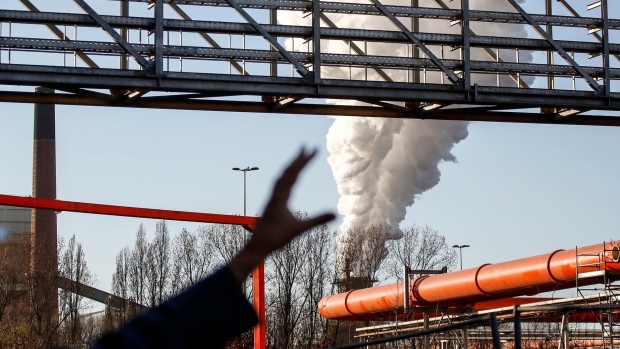Dec 13, 2022
EU Agrees to Tap Carbon Market for €20 Billion in Energy Pivot
, Bloomberg News

(Bloomberg) -- European Union policymakers agreed to raise €20 billion ($21.3 billion) from the region’s carbon market to help finance the bloc’s strategy to wean itself off Russian natural gas, in a deal that is set to involve the use of some permits currently withdrawn from the system.
Under the agreement clinched on Wednesday between member states and the European Parliament, 40% of the funding will come from front-loaded government auctions of emissions allowances, according to two EU officials with knowledge of the talks. The remaining 60% will be raised through sales of permits earmarked for an innovative technologies fund, which will then be partly replenished by certificates temporarily withheld from circulation and parked in the Market Stability Reserve.
The funding structure marks a change from an original proposal put forward in May by the European Commission, which wanted the MSR to be the sole funding source for the RePowerEU strategy, a move criticized by investors for undermining regulatory certainty. The commission defended the plan, saying the bloc needed to act quickly to accelerate the shift to renewables and diversify its gas supply sources amid a cut in deliveries from Russia.
“It’s important to address the triple crisis: Europe’s dependency on Russia, high energy prices and climate,” said Peter Liese, lead negotiator on the funding for the European Parliament. “This is a balanced deal. The important signal is that European industry will be supported in its decarbonization.”
Benchmark EU carbon permits closed at €88.64 a ton on Tuesday, having almost tripled over the past two years. Under the deal, the innovation fund will be replenished with allowances from the EU Emissions Trading System’s stability reserve to compensate for 10% of the financing package.
Created to automatically stabilize the carbon market, the reserve started operating in 2019 by withholding from trading a share of certificates to alleviate a glut that had for years weighed on pollution prices. At the end of last year, it held 2.6 billion allowances, enough to cover almost three times the bloc’s entire emissions in the second quarter.
While the MSR is currently absorbing excess permits, it’s forecast to gradually start releasing the allowances back to the market in several years as the number in circulation drops in line with shrinking pollution limits.
The Innovation Fund currently has 450 million allowances that will be monetized over the 2021-30 period. During the talks that stretched into early morning in Europe on Wednesday, the commission, member states and the parliament agreed that its size should be increased as part of ongoing negotiations on a reform of the carbon market.
©2022 Bloomberg L.P.






